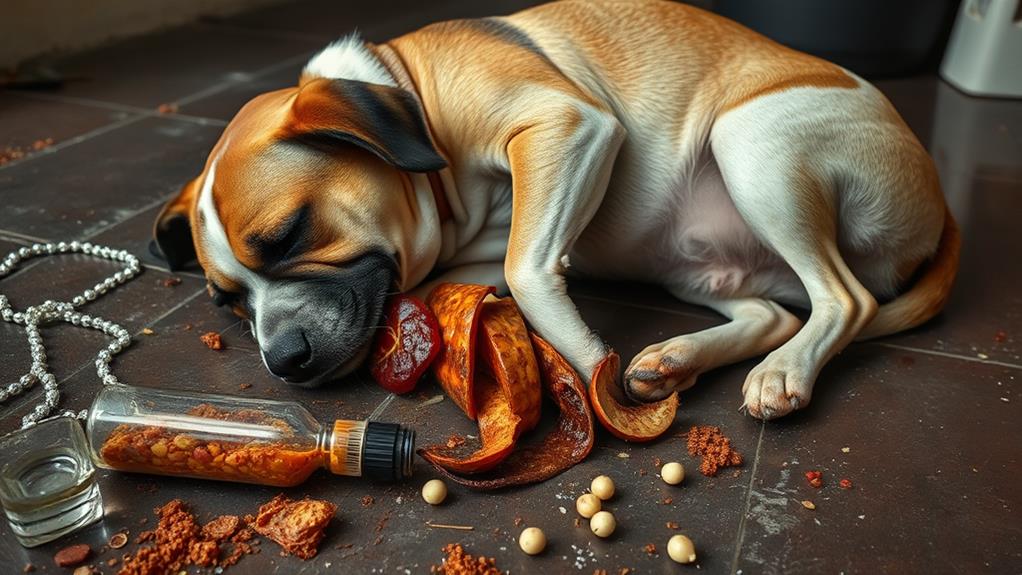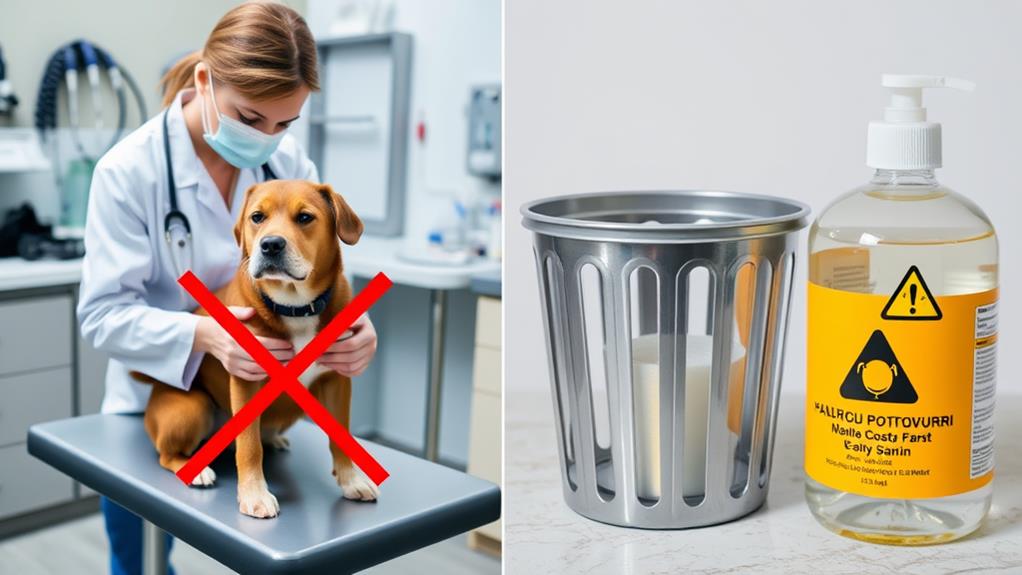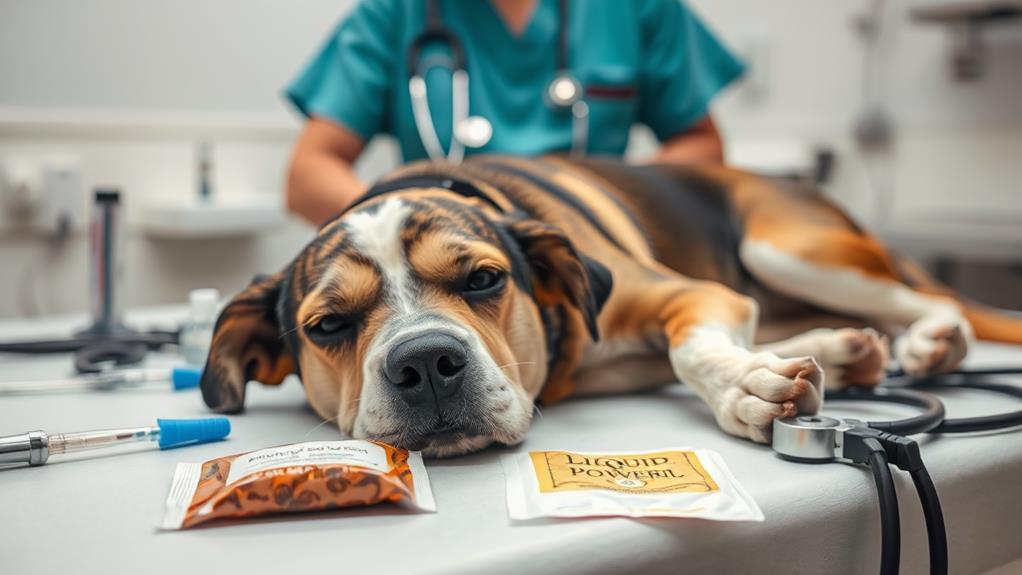Liquid Potpourri: Poisoning Risks in Dogs
- Advertisement -
You may not realize that the fragrant liquid potpourri in your home poses a significant threat to your dog's health, as the essential oils it contains can cause vomiting, diarrhea, and tremors if ingested. In severe cases, liquid potpourri poisoning can lead to seizures, respiratory distress, and even organ failure. Small breed dogs and puppies are more susceptible to poisoning due to their size, and dogs with pre-existing medical conditions may be more prone to complications. It's vital to keep liquid potpourri out of reach of your dog and know the signs of poisoning, such as vomiting, diarrhea, and difficulty breathing, and what to do next to guarantee your dog's safety.
Key Takeaways
- Liquid potpourri can be toxic to dogs, causing vomiting, diarrhea, tremors, and even organ failure if ingested.
- Essential oils in potpourri, like tea tree oil and peppermint oil, can cause severe poisoning in dogs, especially small breeds and puppies.
- Inhaling potpourri fumes can lead to respiratory distress, while direct contact can cause skin irritation and gastrointestinal upset.
- If you suspect liquid potpourri poisoning, act quickly and contact a veterinarian or the Pet Poison Helpline for guidance and treatment.
- To prevent poisoning, store potpourri out of reach, dispose of it properly, and consider using pet-safe alternatives.
Essential Oils and Liquid Potpourri
Liquid potpourri can be hazardous to dogs due to the presence of essential oils. As a dog owner, it's crucial to understand the risks associated with these oils.
Essential oils like tea tree oil, lavender oil, and peppermint oil are commonly found in liquid potpourri. When ingested, these oils can cause vomiting, diarrhea, and tremors in dogs. In severe cases, liquid potpourri poisoning can lead to seizures, respiratory distress, and even organ failure.
If you suspect your dog has ingested liquid potpourri, act quickly. Contact your veterinarian for guidance on treatment. Your veterinarian may recommend:
- Inducing vomiting
- Administering activated charcoal
- Providing supportive care to manage symptoms
In severe cases, hospitalization may be necessary to ensure your dog receives proper treatment.
To minimize risks, keep liquid potpourri out of reach of your dog. If you're unsure about the safety of a particular product, err on the side of caution and avoid it altogether.
Hazardous Effects on Dogs' Health
Liquid potpourri can pose a significant threat to your dog's health. When dogs are exposed to essential oils and liquid potpourri, they can quickly absorb toxic chemicals through their skin or mouth. This can lead to gastrointestinal problems, liver damage, and nervous system disorders.
Certain essential oils, such as pennyroyal oil and tea tree oil, are particularly hazardous to dogs. Pennyroyal oil can cause liver damage, while tea tree oil can lead to nervous system disturbances. Liquid potpourri can also cause chemical burns and skin irritation in dogs.
The cationic detergents in potpourri can cause severe damage to a dog's gastrointestinal tract, potentially leading to death. Small breed dogs and puppies are more susceptible to liquid potpourri poisoning due to their size. Dogs with pre-existing medical conditions may also be more prone to complications.
If you suspect your dog has come into contact with liquid potpourri, it's crucial to seek immediate veterinary attention. The chemicals in potpourri are absorbed quickly, and even small amounts can be deadly. Prompt treatment is essential to prevent severe consequences, including liver disease and death.
As a dog owner, it's essential to be aware of the risks associated with liquid potpourri and take necessary precautions to protect your dog's health. Keep liquid potpourri out of reach of your dog, and consider alternative air fresheners that are safer for your pet.
Signs of Liquid Potpourri Poisoning

If your dog ingests liquid potpourri, you might not always know. However, there are signs to look out for. Check for a strong fragrance or scent on their hair coat, skin, or breath. Other symptoms include difficulty breathing, walking, or an uncoordinated gait. If you notice any of these signs, it's essential to get your dog to a vet right away. Prompt veterinary attention can help prevent severe consequences.
Symptoms Appear
If your dog ingests liquid potpourri, symptoms can appear within 15-30 minutes. Seek immediate veterinary attention if you suspect ingestion. The severity of symptoms depends on the amount and type of potpourri consumed, as well as your dog's size and sensitivity.
Common symptoms include vomiting, diarrhea, drooling, and excessive thirst. Your dog may also exhibit signs of oral and gastrointestinal irritation, such as pawing at the mouth or abdomen. The oil of cinnamon, a common ingredient in liquid potpourri, can cause severe irritation to the mucous membranes and skin.
Your veterinarian will administer supportive treatment to manage symptoms and prevent complications. This may include inducing vomiting, providing activated charcoal to absorb the toxin, and offering fluids to prevent dehydration. Prompt treatment is crucial to ensure your dog recovers from liquid potpourri poisoning.
In an emergency, every minute counts. If you suspect your dog has ingested liquid potpourri, don't delay – get to the veterinarian right away.
Poisoning Diagnosis
Liquid potpourri poisoning can be diagnosed within minutes of ingestion. A diagnosis is typically made based on physical exam findings, medical history, and laboratory tests.
If you suspect your dog has ingested liquid potpourri, contact the Poison Helpline or a veterinarian immediately. They may advise you to induce vomiting, but only under their guidance. A physical examination will help identify symptoms.
To diagnose liquid potpourri poisoning, your veterinarian may look for the following signs:
- Vomiting is a common symptom.
- Hyperactivity, or abnormal energy levels, may occur.
- Panting and labored breathing can happen.
- In severe cases, seizures or tremors may occur.
Your veterinarian will create a treatment plan based on the diagnosis. Prompt action and professional guidance are crucial in treating liquid potpourri poisoning.
It's essential to act quickly if you suspect your dog has ingested liquid potpourri. Delaying treatment can worsen symptoms and reduce the chances of a successful recovery.
What to Do in Case of Exposure
If your dog has been exposed to liquid potpourri or essential oils, act quickly. Contact a veterinarian or the Pet Poison Helpline right away. Fast diagnosis and treatment are crucial in these situations.
Provide as much information as possible to your veterinarian. This includes the product packaging. This information helps your veterinarian decide on the best course of action.
Rapid Diagnosis Essential
Liquid potpourri poisoning requires immediate action. Quick diagnosis and treatment are crucial to prevent severe symptoms and even death.
To ensure your dog receives necessary care:
- Call a veterinarian or the Pet Poison Helpline (800-213-6680) right away for guidance.
- Bring the product packaging to the veterinary clinic to aid in diagnosis and treatment.
- Don't induce vomiting or give your dog activated charcoal. This can worsen the situation and delay proper treatment.
- Wash your dog's skin or fur with hand dishwashing detergent to minimize absorption of toxic chemicals.
In liquid potpourri poisoning cases, time is critical. By acting swiftly and following these steps, you can help your dog get the necessary medical attention.
Immediate Veterinary Action
If your dog comes into contact with liquid potpourri, act quickly to minimize harm. Call a veterinarian or the Pet Poison Helpline (800-213-6680) immediately for advice on the best course of action. Avoid inducing vomiting or giving activated charcoal, as this can make the situation worse. Instead, collect the product packaging in a sealed container and bring it to the veterinary clinic to help with diagnosis and treatment.
Wash off any product on the skin or fur using hand dishwashing detergent to prevent further absorption of toxic chemicals. Prompt medical attention is crucial, as delays can lead to severe symptoms and even death. Your veterinarian will provide supportive care, including treatment and monitoring, to ensure the best possible outcome.
Key steps to take:
- Call a veterinarian or the Pet Poison Helpline immediately
- Collect product packaging for the veterinary clinic
- Wash off any product on the skin or fur
- Seek prompt medical attention
Product Packaging Importance
If your dog has been exposed to liquid potpourri, it's crucial to bring the product packaging to the veterinary clinic. The packaging contains vital information, including the ingredients and their concentrations. This information helps your veterinarian determine the best course of treatment.
When you arrive at the clinic, provide the following information:
- Bring the product packaging to help identify the ingredients and their concentrations.
- Describe the exposure in detail, including the amount and duration of contact.
- Share your dog's symptoms, such as vomiting, diarrhea, or skin irritation.
- Disclose any first aid measures you've taken, like rinsing your dog's skin or inducing vomiting.
The packaging may list ingredients like sweet birch oil, which can cause chemical burns if ingested. By providing this information, you'll help your veterinarian make an accurate diagnosis and develop an effective treatment plan.
- Advertisement -
Treatment and Prevention Strategies

If you suspect your dog has ingested liquid potpourri, seek immediate veterinary attention. Your veterinarian will diagnose and treat your dog. Treatment may include blood work, IV fluids, and medication based on symptoms. Do not induce vomiting, as this can cause re-exposure to the toxic chemicals. However, your veterinarian may recommend administering milk, water, or ice cream to dilute the chemicals and protect the stomach lining.
Supportive treatment for liquid potpourri poisoning may involve:
- Intravenous fluids to prevent dehydration
- Pain medication to manage pain
- Antibiotic and lubricant drops for eye exposure
- Topical creams for skin exposure
To prevent accidental ingestion and exposure, take the following steps:
- Keep liquid potpourri out of your dog's reach
- Store it in a secure, inaccessible location
- Dispose of used potpourri properly
- Consider using pet-safe alternatives to liquid potpourri
- Educate family members and guests about the risks of liquid potpourri poisoning in dogs
Liquid Potpourri Poisoning Risks
Liquid potpourri poses significant risks to dogs. As a pet owner, it's essential to understand these risks to take necessary precautions.
Inhaling liquid potpourri fumes can cause respiratory distress, leading to symptoms such as coughing, sneezing, and difficulty breathing. Direct contact with the substance can cause skin irritation, resulting in redness, itching, and inflammation. If ingested, liquid potpourri can cause gastrointestinal upset, including vomiting, diarrhea, and abdominal pain.
In severe cases, liquid potpourri poisoning can lead to organ damage, including liver and kidney failure. These complications can be life-threatening if left untreated. Recognizing these risks is crucial to preventing liquid potpourri poisoning in dogs.
To keep your pets safe, it's vital to take proactive measures. Understanding the risks associated with liquid potpourri poisoning is the first step in safeguarding your dogs' health. By being aware of these risks, you can take necessary precautions to prevent potential tragedies.
The risks associated with liquid potpourri poisoning can be broken down into four main categories:
- Respiratory distress: Inhaling fumes can cause coughing, sneezing, and difficulty breathing.
- Skin irritation: Direct contact can cause redness, itching, and inflammation.
- Gastrointestinal upset: Ingestion can lead to vomiting, diarrhea, and abdominal pain.
- Organ damage: Severe cases can result in liver and kidney failure, which can be life-threatening if left untreated.
Diagnosis and Treatment Options

If your dog ingests liquid potpourri, prompt veterinary care is essential. The faster your dog receives treatment, the better their chances of minimizing toxic effects. Your veterinarian will create a treatment plan based on your dog's symptoms.
Symptoms of liquid potpourri poisoning may include difficulty breathing, difficulty walking, and lethargy. To diagnose the condition, your veterinarian may run blood tests and provide IV fluids. Medication may be prescribed to manage symptoms.
Do not induce vomiting if you suspect your dog has ingested liquid potpourri. This can cause your dog to re-expose themselves to the toxic chemicals. Instead, your veterinarian may recommend giving your dog milk, water, or ice cream to dilute the chemicals and coat the stomach lining.
In severe cases, hospitalization may be necessary to monitor and treat respiratory distress. Anticonvulsants and muscle relaxants may be used to manage seizures and tremors. The prognosis is usually good if treatment is prompt and aggressive. However, recovery depends on the specific oils ingested and the severity of the poisoning.
If you suspect your dog has ingested liquid potpourri, seek immediate veterinary attention. Your veterinarian will develop a treatment plan tailored to your dog's specific needs, which may include hospitalization, medication, and supportive care. Prompt action can increase your dog's chances of a full recovery.
Prevention and Safety Measures
Preventing Liquid Potpourri Poisoning in Dogs
To reduce the risk of liquid potpourri poisoning in your dog, follow these steps:
- Store liquid potpourri products in a secure location where your dog cannot access them.
- Dispose of used potpourri properly to prevent your dog from coming into contact with the residue.
- Consider using pet-safe alternatives to liquid potpourri to minimize the risk of poisoning.
- Inform family members and guests about the risks of liquid potpourri poisoning in dogs so everyone is aware of the potential dangers.
In case of an emergency, keep the following phone numbers handy:
- Pet Poison Helpline: 800-213-6680
- Your veterinarian's contact information
Frequently Asked Questions
Is Potpourri Poisonous for Dogs?
Potpourri can be poisonous for dogs. The fragrances and liquids in potpourri can cause symptoms like vomiting, diarrhea, and tremors. If your dog ingests potpourri, it's essential to monitor their behavior and seek veterinary care if you notice any adverse reactions.
To keep your dog safe, consider alternatives to potpourri. Essential oil diffusers can provide a pleasant scent without the risks associated with potpourri. You can also make your own potpourri using natural ingredients like dried flowers, herbs, and spices.
Be aware of the potential hazards in your home and take steps to protect your dog. Keep potpourri and other fragrant items out of reach, and consider dog-proofing your space to prevent accidents. By taking these precautions, you can help ensure your dog's safety and well-being.
How Soon Will I Know if My Dog Has Been Poisoned?
If you suspect your dog has been poisoned, act quickly. The time it takes for symptoms to appear varies, but warning signs can show up within 15 minutes to several hours after ingestion. Knowing this timeline is crucial because the faster you react, the better the treatment outcome.
When seeking veterinary care, be prepared to provide information on the potential toxin and when the exposure occurred. This helps the vet determine the best course of action. Toxicity test results can take time, so don't delay seeking care.
Symptoms can appear at different times depending on the toxin and the amount ingested. Common signs of poisoning include vomiting, diarrhea, lethargy, and difficulty breathing. If you notice any of these symptoms, contact your vet immediately.
How Do You Flush Poison Out of a Dog's System?
If your dog has ingested poison, it's crucial to seek veterinary care immediately. Do not attempt to induce vomiting, as this can make the situation worse. Activated charcoal is also not recommended, as it can exacerbate the condition.
Your vet will likely recommend supportive care to help flush the poison out of your dog's system. This may include IV fluids to help your dog stay hydrated and gastric lavage to remove the toxin from the stomach. In some cases, your vet may also administer medication to help manage symptoms and prevent further complications.
It's essential to follow your vet's instructions carefully and monitor your dog's condition closely. With prompt and proper treatment, your dog can recover from poisoning. However, the outcome depends on the type and amount of poison ingested, as well as the promptness and effectiveness of treatment.
What Are the Dangers of Potpourri?
Potpourri can be a hazard in your home. The dry ingredients in potpourri mixes can irritate your skin and respiratory system. Strong scents can also overwhelm your senses. Homemade potpourri recipes and aromatic blends are particularly risky because they often contain too much fragrance. When handling potpourri, be aware of the potential consequences of exposure.
If you have sensitive skin or allergies, be cautious when touching potpourri. The dry ingredients can cause irritation, itching, or rashes. Inhaling the scents can also trigger respiratory issues, such as coughing or sneezing.
To minimize risks, handle potpourri carefully. Wash your hands after touching it, and avoid inhaling the scents deeply. If you experience any irritation or discomfort, remove the potpourri from your home.
In summary
Liquid potpourri can be highly toxic to dogs, even in small amounts. It's crucial to prioritize your dog's safety over the pleasant smell. To protect your dog, it's essential to understand the risks and take preventive measures.
Liquid potpourri contains ingredients that can cause severe symptoms in dogs, including vomiting, diarrhea, and abdominal pain. In severe cases, it can lead to more serious health issues, such as seizures and organ failure.
To keep your dog safe, make sure to:
- Keep liquid potpourri out of reach of your dog
- Avoid using it in your home or yard
- Supervise your dog when you have guests to ensure they don't bring liquid potpourri into your home
- If you suspect your dog has ingested liquid potpourri, contact your veterinarian or a pet poison hotline immediately
Remember, it's always better to err on the side of caution when it comes to your dog's safety. By taking these simple steps, you can help prevent liquid potpourri poisoning and create a safe environment for your dog.
- Advertisement -

